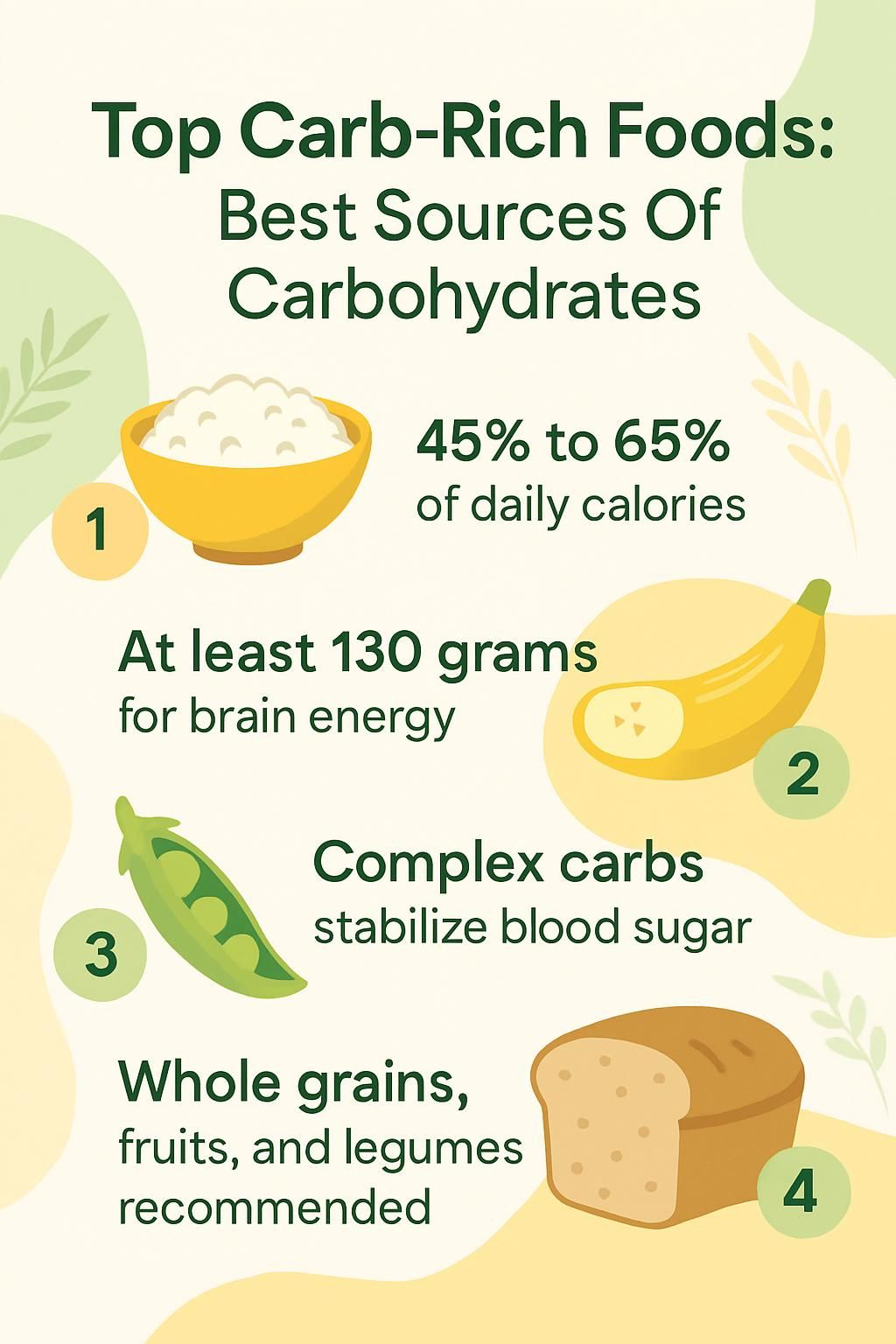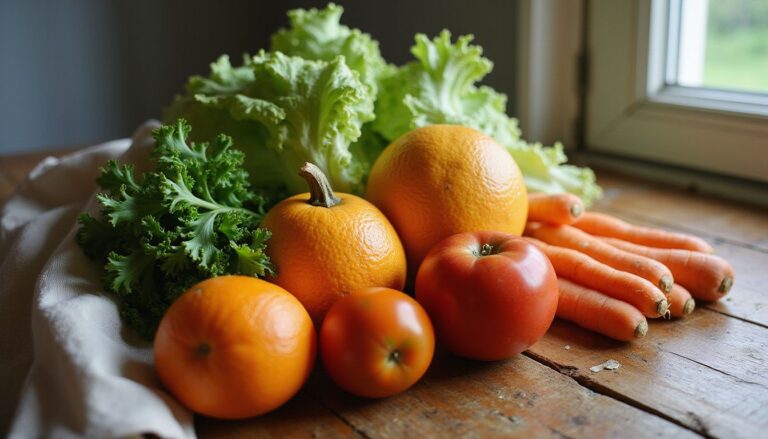Top Carb-Rich Foods: Best Sources Of Carbohydrates
Our Nutrition Assistant AI Suite will transform your body. You will lose fat, get toned, and build muscle. Gain confidence and optimal health.
Choosing healthy foods that are high in carbohydrates can feel confusing. Carbohydrates, or carbs, power daily life, yet the type you pick affects energy, mood, and health. In this guide, I share simple picks and practical tips so you can choose smart, satisfying carb sources without stress.
You will find the best carbohydrate-rich foods for steady fuel and key nutrients. Small swaps today can build better focus, better digestion, and more consistent energy.
Key Takeaways
- The 2020 to 2025 Dietary Guidelines suggest 45 to 65 percent of daily calories from carbohydrates. On a 2,000 calorie plan, that is about 225 to 325 grams per day.
- Top healthy carb-rich foods include whole grains like brown rice and oats, fruits such as bananas and apples, vegetables, legumes like chickpeas and lentils, and dairy.
- Complex carbohydrates that are high in fiber help stabilize blood sugar, improve fullness, support digestion, and lower chronic disease risk, according to Harvard T.H. Chan School of Public Health[1].
- Highly processed or refined carbs like white bread cause quick blood sugar spikes. Over time, frequent spikes raise the risk for weight gain and type 2 diabetes.
- Aim for at least 130 grams of quality carbohydrates each day to meet basic brain energy needs. Choose minimally processed foods for the best health outcomes.

What are carbohydrates and how do they work in the body?

Carbohydrates are the body’s main source of energy. During digestion, the body breaks carbs into glucose, a simple sugar. Glucose moves through the blood and fuels cells in every organ and tissue.
What are the different types of carbohydrates?
Carbohydrates fall into three main types: sugars, starches, and fiber. Sugars are simple carbs found in fruit, milk, and sweetened foods or drinks. Starches are complex carbs in foods like oats, brown rice, quinoa, barley, corn, potatoes, and beans. Fiber is a carb the body cannot digest for energy, yet it supports gut health and fullness.
High fiber foods include whole grain bread and oatmeal, apples and oranges, beets and peas, and beans or lentils. I notice whole grains keep me full longer than sugary snacks. Complex carbs support steadier blood sugar than refined grains with added sugar.
Dietary fiber also supports healthy digestion and lowers disease risk linked to highly processed foods.
Why are carbohydrates important for a healthy diet?
Carbohydrates supply most of the energy that your body and brain use each day. Learning which foods to choose makes healthy eating simpler and more satisfying.
How do carbohydrates provide energy?
After I eat foods high in carbs, enzymes break them down into glucose. Glucose enters my bloodstream and moves into cells, where it becomes fuel. My brain, muscles, and organs use this energy during daily tasks and exercise.
Cells can use glucose right away or store it as glycogen in muscle and liver. During a study session or a jog, stored glycogen converts back to glucose and keeps me going between meals.
Each gram of carbohydrate provides about 4 calories of usable energy for the body and mind.
Next, I explain how carbs support brain function.
How do carbohydrates affect brain function?
The brain relies on glucose as its main fuel. When carb intake is too low, many people feel tired, foggy, or irritable. Research shows steady blood sugar supports memory, focus, and mood.
High carb foods like oats, whole wheat bread, and fruit also supply vitamins and minerals that support cognition. When I eat fruit and a whole grain breakfast, I feel more alert for morning tasks.
Guidelines suggest at least 130 grams of carbs per day to meet basic brain energy needs.
How do carbohydrates contribute to overall health?
Whole grains, fruits, and non-starchy vegetables provide vitamins, minerals, and antioxidants that protect the heart and other organs. Fiber from plant carbohydrates improves digestion, helps lower blood pressure, and supports a healthy gut.
Choosing the right amount of carbs helps regulate blood glucose. That lowers the risk of type 2 diabetes and may improve cholesterol levels. Minimally processed foods help manage weight by keeping me full longer with fewer added sugars.
Mixing oats, quinoa, sweet potatoes, beets, and legumes gives steady energy and fewer sugar spikes. Nutrient dense carb foods support tissues at the cellular level and strengthen immune defenses.
How many carbs should you eat daily?
Your daily carbohydrate needs depend on age, activity level, and health goals. Labels and ingredient lists help you match foods to your plan.
What is the recommended daily carbohydrate intake?
Most people should get 45 to 65 percent of daily calories from carbohydrates. For a 2,000 calorie plan, that equals about 225 to 325 grams per day.
I use a food tracker or the Nutrition Facts label to see how my choices add up. Some people need fewer carbs, such as those on a low-carb plan or with certain medical conditions. Talk with a registered dietitian or your clinician if you have diabetes or another health concern.
Whole grains, fruits, vegetables, and legumes supply starchy carbohydrates along with vitamins and minerals that support energy and cell function.
What factors affect your carbohydrate needs?
Age affects carb needs. Growing kids and teens often need more energy. Older adults may need fewer calories because metabolism slows with age.
Activity level matters too. Athletes or very active people burn more glucose and usually need more high carb foods like oats, bananas, or brown rice. Pregnancy increases energy needs and changes appetite.
Health conditions also guide choices. People with diabetes track their carbohydrate intake to manage blood sugar. Some people choose gluten free grains, like quinoa or corn, when needed.
Top carb-rich foods: Best sources of carbohydrates
Many foods are rich in carbohydrates and can fit into a healthy diet. Choosing high quality sources supports weight management, provides essential nutrients, and keeps you full longer.
Whole grains
Whole grains like brown rice, oats, barley, and whole wheat bread contain the bran, germ, and endosperm. Keeping all three parts means more fiber and more nutrients than refined grains.
Whole grains have a lower glycemic impact than white bread or cookies. That helps steady blood sugar and curb cravings. I find a warm bowl of oatmeal keeps my energy even through the morning.
They also support gut health and provide minerals such as iron and magnesium. Choosing whole grains over refined grains is a simple upgrade with big benefits.
Quinoa
Quinoa is a nutrient dense seed that cooks like a grain. One cup of cooked quinoa has about 39 grams of carbs, plus fiber and protein. It also supplies minerals like magnesium and iron, and folate, a B vitamin.
I use quinoa as a base for salads or mix it into soups for extra texture. As a complex carb, it releases energy slowly and helps me avoid midafternoon dips.
Brown rice
Brown rice is a whole grain with about 45 grams of carbs per cooked cup. It keeps the bran and germ, which adds fiber and B vitamins. The fiber slows digestion and supports steady energy.
Brown rice has a gentler effect on blood sugar than many refined carbs. I enjoy its nutty flavor with sautéed vegetables and lean protein.
Oats
Oats provide about 27 grams of carbs per cooked cup and are rich in beta glucan, a soluble fiber that supports heart health. Beta glucan also helps manage blood sugar.
Oats supply minerals like iron, magnesium, and zinc. A bowl of oatmeal, or oats stirred into yogurt with berries, keeps me full for hours.
Barley
Cooked barley offers about 44 grams of carbs per cup and around 6 grams of fiber. It has very little sugar and a chewy texture that works well in soups and salads.
Barley supplies selenium, magnesium, and phosphorus, which support cell and organ function. I often swap barley for white rice to raise fiber and improve fullness.
Fruits
Fruit gives quick energy along with water, vitamins, and antioxidants. Bananas, oranges, apples, and blueberries all provide natural sugars plus fiber. That mix helps energy last longer than candy or soda.
I choose fresh fruit most days because it delivers a wide range of nutrients in a simple snack.
Bananas
A medium banana has about 27 grams of carbs, plus potassium, vitamin C, and fiber. As bananas ripen, starch turns into simple sugars, which makes them easy to digest before or after workouts.
During marathon training, a banana before long runs gave me quick energy without stomach upset.
Oranges
One medium orange has about 15 grams of carbs and 12 grams of natural sugar. Oranges also provide vitamin C and water, which help with hydration and immune support.
I like an orange after exercise for a light, refreshing carb source that tastes great.
Apples
One medium apple has about 25 grams of carbs and useful fiber. Apples also contain vitamin C and potassium, which support heart and muscle function.
I find an apple gives long lasting energy during busy afternoons without a sugar crash.
Blueberries
One cup of blueberries has about 21 grams of carbs and several grams of fiber. They also provide vitamin C and plant compounds that protect cells.
I add blueberries to oatmeal or yogurt for natural sweetness and a nutrient boost.
Vegetables
Starchy vegetables like sweet potatoes, beets, corn, and peas supply complex carbs along with vitamins and minerals. They digest more slowly than sugary foods, so they help you feel full longer.
Roasted beets or steamed corn add color, flavor, and steady energy to simple meals.
Sweet potatoes
One medium sweet potato contains about 26 grams of carbs and several grams of fiber. The orange color comes from beta carotene, which the body turns into vitamin A for eye and immune health.
I like to roast wedges with a little olive oil. They taste sweet without added sugar and pair well with chicken or beans.
Beets
One cup of cooked beets has about 13 grams of carbs, plus fiber and minerals like potassium and magnesium. The red color comes from betalains, plant compounds that act as antioxidants.
Beets fit well in salads or grain bowls. I use them for gentle, natural sweetness and extra nutrients.
Corn
One cup of cooked corn provides about 30 grams of carbs, fiber, and B vitamins. Its natural sweetness makes it a family favorite, while complex carbs help steady blood glucose.
I often add corn to salads or chili for more texture and energy.
Peas
One cup of green peas contains about 21 grams of carbs and 8 grams of protein. Peas also offer fiber and minerals like potassium and iron.
I keep frozen peas on hand because they cook fast and keep their nutrients.
Legumes
Legumes like chickpeas, kidney beans, and lentils supply complex carbs, fiber, and plant protein. That combination supports fullness and steady blood sugar.
I rotate different legumes during the week to add variety and nutrients without much cost.
Chickpeas
One cup of cooked chickpeas has about 45 grams of carbs, plus protein, fiber, and folate. Chickpeas have a lower glycemic impact than many refined grains. They release glucose more gradually.
I add them to salads or blend them into hummus for a quick, satisfying snack.
Kidney beans
Half a cup of cooked kidney beans provides about 22 grams of carbs and helpful fiber. They also contain minerals like iron and magnesium.
I like kidney beans in soups and grain bowls. Their slow-digesting starch supports steady energy for hours.
Lentils
One cup of cooked lentils provides about 40 grams of carbs and a high amount of fiber. Lentils also supply iron, magnesium, and potassium.
I use them in stews and salads when I want steady energy without a blood sugar spike.
Dairy products
Milk and yogurt provide simple carbohydrates from lactose, the natural sugar in dairy. They also offer protein and calcium. Cheese contains less carbohydrate but can add protein and flavor to balanced meals.
If you are lactose intolerant, fortified soy milk or lactose free milk are good alternatives with similar carbs.
Milk
One cup of milk has about 12 grams of carbs as lactose. It also supplies calcium, potassium, and protein that support bones and muscles. I often add milk to oatmeal for extra creaminess and nutrients.
Here is a quick snapshot of one cup, or 240 milliliters, of milk:
| Nutrient | Amount per cup |
|---|---|
| Carbohydrate | 12 g |
| Protein | 8 g |
| Calcium | 305 mg |
| Potassium | 366 mg |
Milk also supports hydration and recovery after exercise because it provides fluid, carbs, and electrolytes.
Yogurt
Plain yogurt contains about 12 grams of carbs per cup, mostly from lactose. It provides calcium, potassium, and often vitamin D for bone health. Live cultures in yogurt support a healthy gut.
I choose unsweetened yogurt and add fruit for flavor without extra added sugar.
Cheese
Cheese is low in carbs, for example a slice of cheddar has about 0.4 grams. It still delivers protein, calcium, and vitamin B12.
I pair a small amount of cheese with whole grain bread or fruit for a balanced snack. Lower sodium options help me manage salt intake.
Benefits of choosing healthy carb sources
Choosing healthy carbs gives steady energy and valuable nutrients that support every part of the body.
How do healthy carbs provide fiber and nutrients?
Whole grains, fruits, and vegetables like oats, apples, sweet potatoes, and beets deliver fiber plus minerals. For example, a serving of oats can supply about 4 grams of fiber along with magnesium and iron.
After I added more brown rice and lentils to my meals, my digestion improved. Fiber feeds good gut bacteria and helps absorb key nutrients. Healthy carbs also provide vitamins C and B, potassium, and helpful plant compounds that protect cells.
How do healthy carbs release energy steadily?
Healthy carbs contain fiber and complex starch structures. These take longer to break down, which slows glucose entry into the blood. Oats, brown rice, beans, apples, and sweet potatoes give gradual, longer lasting energy.
That slow release helps prevent sugar crashes and supports focus for school, work, or workouts.
How do healthy carbs support digestion and gut health?
Whole grains, fruits, vegetables, and legumes are rich in soluble and insoluble fiber. Soluble fiber, found in oats and beans, forms a gel that slows digestion and helps absorb minerals. Insoluble fiber adds bulk to stool and supports regular bowel movements.
Gut bacteria ferment some fibers into short chain fatty acids. These compounds protect the gut lining and support immune function.
What are the health risks of eating processed or refined carbs?
Eating many refined carbs can displace foods with fiber and key minerals. Over time, this can affect how cells and organs function.
How can processed carbs cause weight gain?
Processed carbs digest quickly, which spikes blood sugar. The body often releases more insulin, a hormone that moves glucose into cells. High insulin levels encourage fat storage.
White bread, pastries, and sugary cereals lack fiber, so I feel hungry soon after eating them. People who eat many refined carbs often take in more calories during the day, which can lead to weight gain.
How do processed carbs affect blood sugar levels?
Refined carbs raise blood sugar fast, then it drops, which can trigger cravings. These swings strain the pancreas, the organ that makes insulin.
Meals high in refined carbs have little fiber, so hunger returns quickly. Diets filled with these foods are linked to higher risk for type 2 diabetes and weight gain. Choosing fiber rich foods lowers the size of blood sugar spikes.
What chronic diseases are linked to processed carb consumption?
High intake of refined carbs is linked to type 2 diabetes, heart disease, and obesity. Studies from Harvard show that people who eat more whole grains have lower risk than those who eat many refined grains.
Frequent blood sugar spikes may damage the pancreas over time. Some research also links high refined carb diets to fatty liver disease and certain cancers.
How can you add healthy carbs to your diet?
I build meals around whole, minimally processed carbohydrates and add protein and healthy fats. This pattern supports steady energy, better digestion, and fewer cravings.
Why balance meals with protein and fats?
Protein repairs tissue and helps you feel full. Healthy fats help you absorb fat soluble vitamins A, D, E, and K. Pairing carbs with protein and fat slows digestion and supports stable blood sugar.
For example, I top whole grain toast with yogurt and fruit or add beans and avocado to a salad.
How to choose whole, minimally processed carbs?
I look for the word “whole” at the start of the ingredient list. I skip products with added sugars or enriched flours. Whole grains such as brown rice, oats, and quinoa can lower heart disease risk compared with refined grains.
Fresh fruit beats canned fruit in heavy syrup. Vegetables like sweet potatoes and corn provide slow, steady energy. Legumes such as chickpeas and lentils add both healthy carbs and plant protein.
How to monitor portion sizes effectively?
Simple visual cues help me keep portions in check. A palm sized portion works for rice or pasta. A closed fist fits a serving of starchy vegetables like sweet potatoes or corn.
Reading labels helps me track grams of carbohydrates per serving. When eating out, I split large portions or save half for later.
Conclusion
Carbohydrates power my day. Whole grains, fruits, vegetables, legumes, and dairy supply energy and key nutrients that support the brain, heart, and gut. Choosing these healthy carbohydrate sources helps me stay focused and active.
Research suggests that diets rich in whole, fiber filled carbs improve digestion and may lower disease risk[1]. If you have a medical condition, talk with a healthcare professional or registered dietitian for personal guidance. Small, steady changes can lead to better energy and long term health.
…
[1]: Harvard T.H. Chan School of Public Health – The Nutrition Source: Carbohydrates.
FAQs
1. What are the top carb-rich foods that provide the best sources of carbohydrates?
Whole grains such as brown rice, oats, and whole wheat bread offer high carbohydrate content with added fiber and nutrients. Starchy vegetables like potatoes and corn also supply significant amounts of carbohydrates. Legumes including lentils and black beans serve as excellent plant-based options.
2. How do these carbohydrate sources compare in nutritional value?
Whole grains contain more fiber, vitamins, and minerals than refined grains according to research from the Harvard T.H. Chan School of Public Health (1). Starchy vegetables deliver potassium and vitamin C along with carbs; legumes add protein and iron for a balanced nutrient profile.
3. Why should I choose complex carbohydrates over simple sugars?
Complex carbohydrates found in whole grains, starchy vegetables, and legumes digest slowly which helps maintain steady blood sugar levels according to studies published by the American Diabetes Association (2). Simple sugars from candy or soda can cause rapid spikes followed by crashes in energy.
4. Can you share a personal example of using carb-rich foods for better health?
After switching my breakfast from white toast to oatmeal topped with berries, I noticed longer-lasting energy throughout my morning routine. This change helped me avoid mid-morning hunger while supporting stable focus at work.
Summary: Whole grains, starchy vegetables, and legumes rank among the best sources of dietary carbohydrates due to their rich nutrient profiles supported by credible research. Choosing complex carbs supports sustained energy levels while offering additional health benefits compared to simple sugars.
References:
(1) Harvard T.H. Chan School of Public Health: The Nutrition Source – Carbohydrates
(2) American Diabetes Association: Glycemic Index & Glycemic Load







